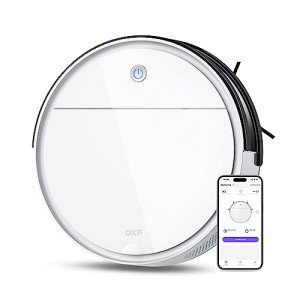Why You Should Concentrate On Improving Robotic Vacuum
The Rise of the Robotic Vacuum Cleaner: Revolutionizing Home Cleaning
In the world of home appliances, robotic vacuum cleaners have emerged as among the most considerable innovations in the last few years. These autonomous devices provide convenience and effectiveness, allowing homeowners to preserve cleaner living spaces without the drudgery of manual vacuuming. This post explores the evolution, performance, advantages, and considerations regarding robotic vacuum, together with supplying insights through information tables and often asked questions.
A Brief History of Robotic Vacuum Cleaners
The journey of robotic vacuum started in the late 20th century, with early prototypes failing to make substantial strides in homes. However, developments in technology led to the intro of more refined models in the early 2000s. Companies such as iRobot and Neato played a pivotal role in promoting these smart home devices.
Advancement Timeline of Robotic Vacuum Cleaners
Year
Milestone
1996
Introduce of the very first robotic vacuum, the ELECTROLUX TRINITY
2002
iRobot introduces the Roomba, an extensively recognized model
2012
Intro of designs with sophisticated mapping abilities
2020
Incorporation of artificial intelligence for boosted navigation
2023
Designs with integrated wise home connectivity and app control
How Robotic Vacuum Cleaners Work
Robotic vacuum cleaners make use of a mix of sensors, mapping technology, and synthetic intelligence to navigate and tidy numerous surfaces successfully. Here's a simplified overview of their core performance:
Sensors: Equipped with infrared or ultrasonic sensors, these devices can discover challenges, cliffs, and dirt, enabling them to browse through spaces without crashing into furniture or tumbling down stairs.
Navigation: Most contemporary robotic vacuum include clever mapping innovations, allowing them to draw up the home design and enhance cleaning paths.
Cleaning Mechanism: Using brushes and suction power, robotic vacuums collect dirt, dust, and particles from different floor types, consisting of carpets and hardwood.
Charging and Cleaning Schedules: After completing a cleaning session or when their battery runs low, these robots automatically go back to their charging dock. click the next internet page can set cleaning schedules through smart device apps, helping preserve a neat home easily.
Advantages of Robotic Vacuum Cleaners
Robotic vacuum use many benefits over standard vacuuming methods. Here are a few of the crucial advantages:
- Time-Saving: Automated cleaning means homeowners can assign their time to other activities.
- Convenience: Scheduling cleaning sessions permits for a clean home without manual intervention.
- Thorough Cleaning: Many robotic models feature specialized brushes to take on animal hair and provide deep cleaning on carpets and rugs.
- Smart Home Integration: Many units work with smart home systems, offering voice control and remote management.
Popular Features in Robotic Vacuum Cleaners
Function
Description
Mapping Technology
Produces a digital map of the cleaning location
Mobile App Control
Supplies users the ability to start/stop or schedule cleaning sessions remotely
Self-Cleaning
Some models have docking stations that can self-empty dust bins
Advanced Sensors
Spots dirt more effectively and navigates better
Voice Control
Suitable with virtual assistants like Alexa and Google Assistant
Factors to consider Before Purchasing a Robotic Vacuum Cleaner
While robotic vacuum cleaners use numerous benefits, prospective purchasers should consider a few elements before making a purchase. Here are some indicate keep in mind:
Key Factors to Evaluate
Floor Type: Certain models perform better on carpets while others excel on tough floors. Buyers ought to select versatile vacuums if they have actually blended floor covering.
Battery Life: Longer battery life permits for extended cleaning sessions. Look for models that can cover big areas without regular charging.
Dustbin Capacity: A bigger dustbin decreases the frequency of emptying, making cleaning less labor-intensive.
Noise Level: Some models run silently, which is best for homes with babies or delicate pets.
Upkeep: Users must also assess the ease of upkeep, especially for filters and brushes.
Prospective Drawbacks
- Rate: Robotic vacuum cleaners can be substantially more costly than conventional vacuums.
- Effectiveness: While they efficiently keep tidiness, they might not constantly match the deep cleaning effectiveness of manual vacuums.
- Challenge Navigation: Some designs might battle with specific types of furnishings or cluttered areas, possibly leading to missed areas.
FAQs About Robotic Vacuum Cleaners
Q1: How often should I run my robotic vacuum cleaner?
A1: It typically depends on your household. For homes with pets or high foot traffic, running it daily is helpful. In less active homes, you might discover every other day suffices.
Q2: Can robotic vacuum work on carpets?
A2: Most robotic vacuums can clean carpets; nevertheless, features such as suction power and brush style can substantially affect their effectiveness on different carpet types.
Q3: Are robotic vacuum cleaners good for pet hair?
A3: Yes, lots of models are specifically created to select up pet hair and include specialized brushes to avoid tangling.
Q4: What occurs when the vacuum runs out of battery?
A4: Most robotic vacuums automatically return to their charging dock when their battery is low, ensuring they are prepared for the next cleaning session.
Q5: Can I control my robotic vacuum with my mobile phone?
A5: Yes, numerous robotic vacuum cleaners come geared up with mobile apps that enable you to arrange cleanings, display progress, and receive alerts.
Robotic vacuum represent a substantial improvement in home-cleaning innovation, combining benefit with effectiveness to essentially change how families preserve tidiness. As innovations continue to emerge, these devices are becoming progressively capable, offering users not just time-saving solutions but also boosted cleaning experiences. As the market continues to grow, potential buyers are encouraged to weigh the features, advantages, and considerations carefully to find the best model tailored to their unique needs. Whether it's a hectic household, a pet lover, or someone seeking automation in their cleaning routine, there's most likely a robotic vacuum that fits the expense.
